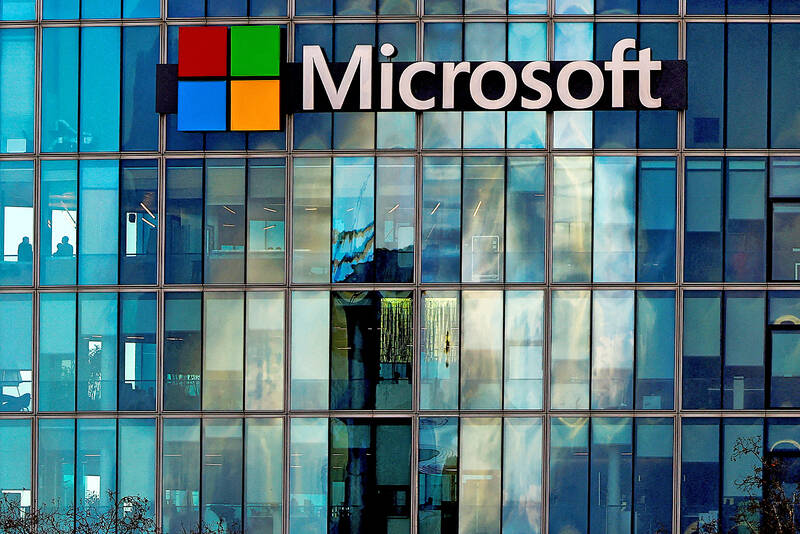Microsoft Corp’s cloud computing and artificial intelligence (AI) business helped deliver US$70.1 billion in sales and boosted profits by 18 percent for the January-March quarter, a dose of relief for investors during a turbulent time for the tech sector and the US economy.
The company, which celebrates its 50th anniversary this year, reported quarterly net income of US$25.8 billion, or US$3.46 per share, beating analysts’ forecasts of earnings of US$3.22 a share.
The Redmond, Washington-based software maker posted revenue of US$70.1 billion in the period, up 13 percent from the same period a year ago and also beating analysts’ expectations. Analysts polled by FactSet expected Microsoft to post revenue of US$68.44 billion for the quarter.

Photo: Reuters
Microsoft CEO Satya Nadella credited cloud growth for its strong quarter. The company’s cloud unit posted revenue of US$26.8 billion, up 21 percent year-on-year and beating analysts’ projections of US$26.17 billion.
“Cloud and AI are the essential inputs for every business to expand output, reduce costs, and accelerate growth,” Nadella said in a statement.
The company also saw a 6 percent increase to US$13.4 billion in revenue in its personal computing unit, which includes its laptop business and Xbox services.
Microsoft in January said it was on track to pump about US$80 billion into capital and infrastructure this fiscal year.
Nadella said on a call with investors that demand for cloud and AI remained strong.
However, Microsoft is constantly tweaking its investments based on efficiency improvements in computing systems and what kind of services customers want, he said.
“We just want to make sure we are accounting for the latest and greatest information,” he said.
Microsoft said its relationship with ChatGPT creator OpenAI was evolving and that it would no longer be the exclusive provider of the key start-up’s colossal computing needs.
The company added that it returned US$9.7 billion to shareholders through dividends and share repurchases during the quarter.
“This was a strong, steady quarter from a company that’s matured into its AI moment,” Emarketer principal analyst Jeremy Goldman said.
Despite a few hiccups, “Microsoft’s ability to turn AI enthusiasm into real revenue ... sets it apart in a field crowded with promise, but short on payoff,” he said.
Additional reporting by AFP

SMART MANUFACTURING: The company aims to have its production close to the market end, but attracting investment is still a challenge, the firm’s president said Delta Electronics Inc (台達電) yesterday said its long-term global production plan would stay unchanged amid geopolitical and tariff policy uncertainties, citing its diversified global deployment. With operations in Taiwan, Thailand, China, India, Europe and the US, Delta follows a “produce at the market end” strategy and bases its production on customer demand, with major site plans unchanged, Delta president Simon Chang (張訓海) said on the sidelines of a company event yesterday. Thailand would remain Delta’s second headquarters, as stated in its first-quarter earnings conference, with its plant there adopting a full smart manufacturing system, Chang said. Thailand is the firm’s second-largest overseas

‘REMARKABLE SHOWING’: The economy likely grew 5 percent in the first half of the year, although it would likely taper off significantly, TIER economist Gordon Sun said The Taiwan Institute of Economic Research (TIER) yesterday raised Taiwan’s GDP growth forecast for this year to 3.02 percent, citing robust export-driven expansion in the first half that is likely to give way to a notable slowdown later in the year as the front-loading of global shipments fades. The revised projection marks an upward adjustment of 0.11 percentage points from April’s estimate, driven by a surge in exports and corporate inventory buildup ahead of possible US tariff hikes, TIER economist Gordon Sun (孫明德) told a news conference in Taipei. Taiwan’s economy likely grew more than 5 percent in the first six months

SUPPLY RESILIENCE: The extra expense would be worth it, as the US firm is diversifying chip sourcing to avert disruptions similar to the one during the pandemic, the CEO said Advanced Micro Devices Inc (AMD) chief executive officer Lisa Su (蘇姿丰) on Wednesday said that the chips her company gets from supplier Taiwan Semiconductor Manufacturing Co (TSMC, 台積電) would cost more when they are produced in TSMC’s Arizona facilities. Compared with similar parts from factories in Taiwan, the US chips would be “more than 5 percent, but less than 20 percent” in terms of higher costs, she said at an artificial intelligence (AI) event in Washington. AMD expects its first chips from TSMC’s Arizona facilities by the end of the year, Su said. The extra expense is worth it, because the company is

The seizure of one of the largest known mercury shipments in history, moving from mines in Mexico to illegal Amazon gold mining zones, exposes the wide use of the toxic metal in the rainforest, according to authorities. Peru’s customs agency, SUNAT, found 4 tonnes of illegal mercury in Lima’s port district of Callao, according to a report by the non-profit Environmental Investigations Agency (EIA). “This SUNAT intervention has prevented this chemical from having a serious impact on people’s health and the environment, as can be seen in several areas of the country devastated by the illegal use of mercury and illicit activities,”